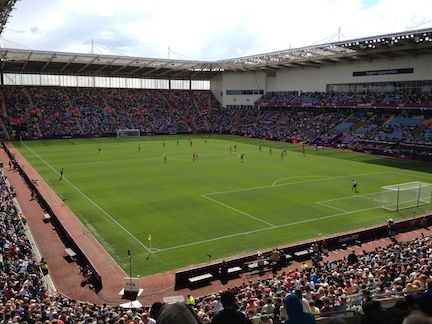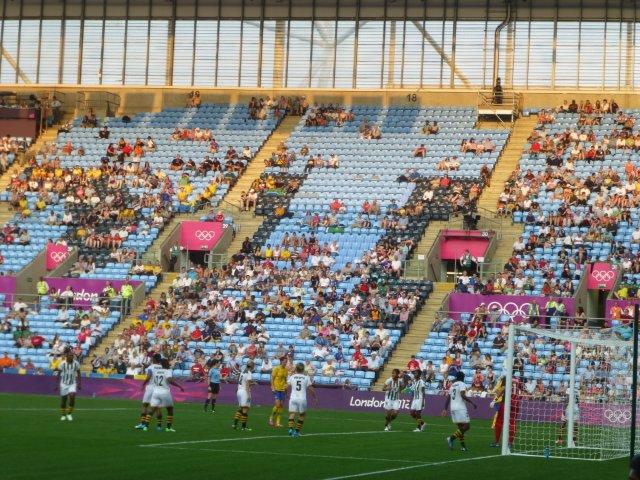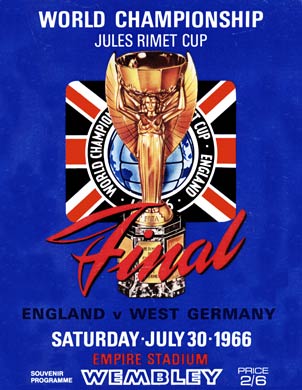
Guest Post by Chris Bolsmann (c.h.bolsmann [at] aston [dot] ac [dot] uk)
After the disappointment of Banyana Banyana’s loss to Sweden (read my post here), I looked forward to the Opening Ceremony of the London Olympic Games and the parade of athletes in particular. The three hour spectacle turned out to be full of contradictions. Danny Boyle provided a fascinating, although selective, history of Britain. He paid homage to the Suffragettes, the National Health Service and immigrants from the West Indies among others, although no reference was made to either slavery or colonialism. I particularly enjoyed his musical selection which included The Jam, Sex Pistols, and The Specials. Watching excited athletes entering the Olympic Stadium can be fun and I was heartened to see Caster Semenya carrying the South African flag.
The lack of visible corporate sponsorship in the stadium and at all Olympic venues is really pleasing to a sports fan’s eye. What a stark contrast to the 2010 World Cup in South Africa where FIFA’s corporate sponsors were visible everywhere. I have yet to come across the Olympics “brand police,” unlike in South Africa where fans wearing Orlando Pirates and Kaizer Chiefs replica shirts emblazoned with the Vodacom sponsor were told to cover them up because MTN — a rival telecom firm — was a national FIFA corporate partner.
Despite the International Olympic Committee’s apparent subtlety, one just has to turn over any Olympic Ticket and the IOC’s “Worldwide Olympic Partners” are clearly visible. The usual suspects appear: unhealthy soft drinks, measly hamburgers and the like, but also a multinational chemical company. Athletes seem unhappy with the restrictions placed on them under the IOC’s Rule 40 protecting official sponsors from “ambush marketing.” Given that athletes can even be disqualified for promoting their individual sponsors, South African swimmer Cameron van der Burgh, Africa’s first gold medal winner, must be cautious since he endorses a range of corporate sponsors on his twitter account which are not “Worldwide Olympic Partners.”
So despite the veneer of a corporate-free Olympic Games, the sponsors and their logos are everywhere. Fizzy soft drinks are even sold as “healthy food” alternatives inside Coventry City’s Ricoh Arena, which has been temporarily renamed the “City of Coventry Stadium” for the Games because the Japanese electronic giant is not an official partner of the IOC. Even the toilets are not safe from the IOC’s attempt at cleansing all traces of rival sponsors. The toilet cisterns and hand dryers have their manufacturer’s names covered up!
I got to watch a double header in this sanitised stadium yesterday as Mexico beat Gabon and South Korea defeated Switzerland. At £20 for a ticket, this represented genuine value for money. Match tickets are cheaper than what Coventry City FC charge in the 3rd tier of English football. The 32,000 seater arena was almost full with 28,000 spectators filling the stands. The empty seats, unfortunately, were the best seats available, those on the half way line behind both substitutes’ benches. According to the IOC, these were seats reserved for their “Worldwide Olympic Partners.” A shame. Besides the fans of the teams on the pitch, there were many families with young children, helped by cheaper youth ticket prices and the Sunday afternoon kickoff time.
As much as I wanted Gabon to silence the Mexican fans’ homophobic chants during opposing goalkeepers’ goal kicks, El Tri were undeniably stronger than their West African counterparts. In an evenly contested first half, Mexico had a couple of good opportunities, but Didier Ovono in the Gabonese goal was equal to the task. The introduction of Giovani dos Santos in the second half gave the Mexicans more creative options up front and he latched onto a long ball in the 62nd minute to put Mexico in front. Giovani sealed the game in the 90th minute after Gabon conceded a late penalty.
Football at the Olympics is different from the World Cup. The kits are different as the German manufacturer is not permitted to advertise their stripes. Football federation logos are replaced by national Olympic associations And for the men, 15 of the 18 members of the team are under 23 years of age. But one just has to look to the corner flags where FIFA has printed its logo and up to the official flags where the IOC’s flag hangs next to that of FIFA. In the end, the corporate interests of the IOC and FIFA merge.
Tag: London 2012 Olympics

Guest Post by Chris Bolsmann (c.h.bolsmann [at] aston [dot] ac [dot] uk)
COVENTRY–In a week when South African cricketers and golfers recorded convincing victories, a hat trick of results would have seen South Africa’s women’s national team celebrate their first appearance at the Olympic Games by beating Sweden. But facing a team ranked 4th in the world, Banyana Banyana (Zulu for “the ladies”) could not pull off the miracle win.
The South Africans met their Swedish counterparts in Coventry, 100 miles north of London, in the second match of a double header. Japan beat Canada 2-1 in the early game in front of 18,000 spectators, while the 2011 World Cup third-place finishers defeated South Africa 4-1.
Normally called the Ricoh Arena and home to Coventry City FC, the City of Coventry Stadium looked quite different from its normal appearance full of advertising hoardings. The Olympic organisers were not quite able to cover up all of Coventry City’s history though, as a photo of the 1987 FA Cup winning team adorned one of the stadium walls.
While Banyana Banyana have always worn the yellow and green colours of the South African Football Association, this time the squad entered the pitch in a horrible-looking green and white vertically striped kit, courtesy of the South African Sports Confederation and Olympic Committee’s official kit supplier: Erke, from China. The crowd had dwindled to a few thousand for the second match and the majority of photo press had left the stadium. A small contingent of South African fans remained who were vocal throughout but were outnumbered by Swedish fans and locals who supported their European neighbours.
Sweden kicked off and, ominously, twice hit the cross bar in the opening six minutes. The Scandinavians went ahead in the 7th minute thanks to a Nilla Fischer shot from outside the box that was cruelly deflected past United States-based Roxanne Barker in the South African goal. Then the Swedes again hit the cross bar and doubled their lead in the 20th minute when Lisa Dahlkvist poked home a ball from the flanks. A minute later Sweden scored a third goal when South African stalwart Janine van Wyk was beaten for pace on a through ball and Lotta Schelin slotted past the on rushing South African keeper. After 21 minutes Banyana’s debut had turned into a nightmare and a real humiliation was on the cards.
The South African midfield were constantly over run by the more forceful and creative Swedes and the defence were outpaced on numerous occasions, allowing for the Swedes to cross balls into the box at leisure. To her credit, Barker dealt well with crosses and high balls and remained calm under constant Swedish pressure.
The second half saw Banyana kick off with far more purpose and creative intent. In the 60th minute, Portia Modise, a former World Player of the Year nominee, dispossessed a Swedish midfielder well within the South African half and from inside the centre circle unleashed a wonderful strike to beat Hedvig Lindahl. Modise’s goal restored South African spirits and momentarily gave South African supporters some hope. But three minutes later Schelin got her second goal of the match and restored the three-goal margin.
The final quarter of the game saw South Africa struggle with fitness and the match ended with a resounding victory for the Swedes. Sweden had over 57% possession and outshot South Africa 21 to 7. Banyana Banyana were outclassed by a technically superior and fitter Swedish side. After the shock of allowing three goals within 25 minutes, Banyana settled and showed a few individual moments of skill but were unable to retain possession for any length of time. It won’t get any easier in this tournament for South Africa: they face Canada on Saturday and World Champions Japan the following week.
 Author, scholar, and journalist David Goldblatt is probably best known for his sacred text of football studies: The Ball is Round: A Global History of Soccer. On Thursday, March 15 (The Ides of March!), Goldblatt shared work from his new project — a sort of mini-Ball is Round book on the cultural politics of football in Britain after 1989.
Author, scholar, and journalist David Goldblatt is probably best known for his sacred text of football studies: The Ball is Round: A Global History of Soccer. On Thursday, March 15 (The Ides of March!), Goldblatt shared work from his new project — a sort of mini-Ball is Round book on the cultural politics of football in Britain after 1989.
In an engaging public talk at the Department of History at Michigan State University, Goldblatt used the upcoming European Championships in Poland/Ukraine and the London Olympics, to explore the changing relationship between football, Britishness, and Englishness in the age of devolution.
The spontaneous popular theater of the Euros, he argues, carves out an arena for England’s traveling fans to declare their “Englishness.” Fans’ rejection of the Union Jack in favor of the flag of St. George and their performance of particular national songs are cases in point. In the case of the 2012 Olympics, Goldblatt notes that there will be no “England” in the tournament because the International Olympic Committee, unlike FIFA, deals only with sovereign states. (Britain has four members in FIFA: England, Scotland, Wales, and Northern Ireland.) The formation of the British Olympic football team thus becomes very contentious in a postdevolution context, with only England firmly supporting it. A striking contemporary example of football’s singular significance for popular national identity.
Listen to Goldblatt’s talk here.